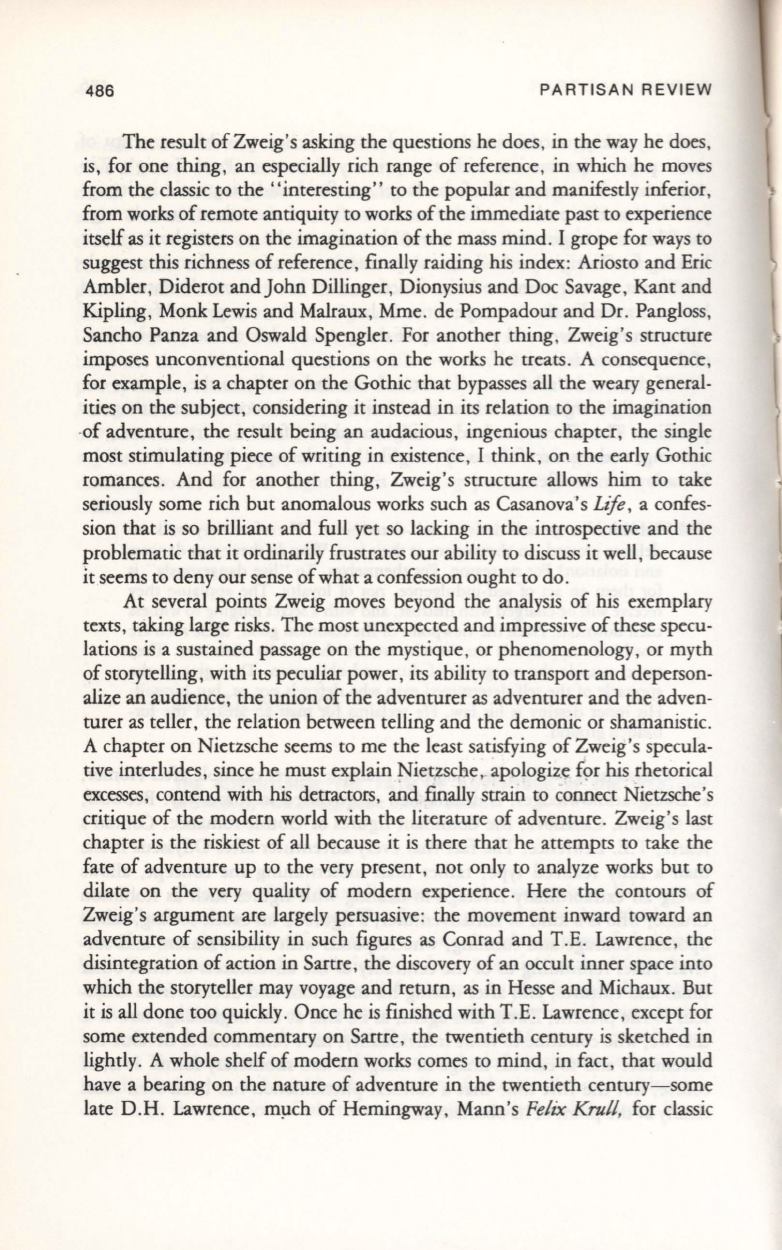
486
PARTISAN REVIEW
The result of Zweig's asking the questions he does, in the way he does,
is, for one thing, an especially rich range of reference, in which he moves
from the classic to the "interesting" to the popular and manifestly inferior,
from works of remote antiquity to works of the immediate past to experience
itself as it registers on the imagination of the mass mind. I grope for ways to
suggest this richness of reference, finally raiding his index: Ariosto and Eric
Ambler, Diderot and John Dillinger, Dionysius and Doc Savage, Kant and
Kipling, Monk Lewis and Malraux, Mme. de Pompadour and Dr. Pangloss,
Sancho Panza and Oswald Spengler. For another thing, Zweig's structure
imposes unconventional questions on the works he treats. A consequence,
for example, is a chapter on the Gothic that bypasses all the weary general–
ities on the subject, considering it instead in its relation to the imagination
·of adventure, the result being an audacious, ingenious chapter, the single
most stimulating piece of writing in existence, I think, on the early Gothic
romances. And for another thing, Zweig's structure allows him to take
seriously some rich but anomalous works such as Casanova's
Ltfe,
a confes–
sion that is so brilliant and full yet so lacking in the introspective and the
problematic that it ordinarily frustrates our ability to discuss it well, because
it seems to deny our sense ofwhat a confession ought to do.
At several points Zweig moves beyond the analysis of his exemplary
texts, taking large risks. The most unexpected and impressive of these specu–
lations is a sustained passage on the mystique, or phenomenology, or myth
of storytelling, with its peculiar power, its ability to transport and deperson–
alize an audience, the union of the adventurer as adventurer and the adven–
turer as teller, the relation between telling and the demonic or shamanistic.
A chapter on Nietzsche seems to me the least satisfying of Zweig's specula–
tive interludes, since he must explain
~ietzsche
.. apologiz.e (pr his rhetorical
excesses, contend with
his
detractors, and finally strain to connect Nietzsche's
critique of the modern world with the literature of adventure. Zweig's last
chapter is the riskiest of all because it is there that he attempts to take the
fate of adventure up to the very present, not only to analyze works but to
dilate on the very quality of modern experience. Here the contours of
Zweig's argument are largely persuasive: the movement inward toward an
adventure of sensibility in such figures as Conrad and T.E. Lawrence, the
disintegration of action in Sartre, the discovery of an occult inner space into
which the storyteller may voyage and return, as in Hesse and Michaux. But
it is all done too quickly. Once he is finished with T.E. Lawrence, except for
some extended commentary on Sartre, the twentieth century is sketched in
lightly. A whole shelf of modern works comes to mind, in fact, that would
have a bearing on the nature of adventure in the twentieth century-some
late D.H. Lawrence, m!lch of Hemingway, Mann's
Felix Krull,
for classic


